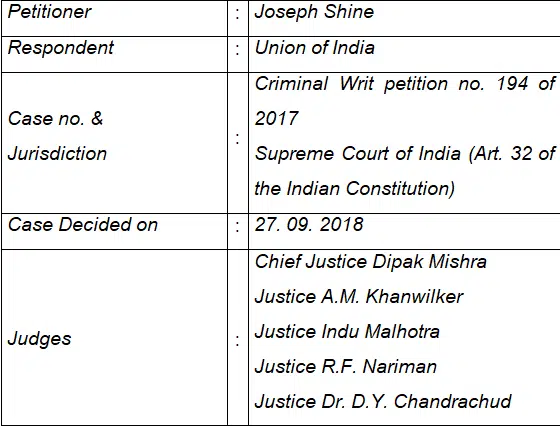Primary Details of the Case:

Case Brief on Joseph Shine v. Union of India (UOI) AIR 2018 SC 4898
INTRODUCTION:
The Indian Constitution, as a progressive law and living document, has always been considered. That way, one of the most important reforms was made in India’s legal history during the case of Joseph shine v. Union of India where rights for aggrieved women are protected through judicial interpretation from men or spouses who violate them. The move is also seen in light of decriminalizing section 377 of the Indian Constitution, which came after this judgement to prove that the constitution is a living and progressive document.
FACTS:
Joseph Shine – petitioner had filed a Public Interest Litigation suit before Supreme court of India under Article 32 of Indian Constitution and challenged constitutional validity of section 497 (Adultery) IPC along with section 198 Cr.P.C.,1973. Issues in question and contentions are as follows
ISSUES:
The following issues were framed by the court;
Firstly, whether section 497 IPC provides for an excessive punishment/ penalization or not and if yes then should it be decriminalized or not?
Secondly, whether said section of IPC makes invalid discrimination & violates Article 14?Of the Indian Constitution or not?
Thirdly, does Section 497 need amendments to ensure gender equality and neutrality?
LAWS INVOLVED:
Section 497 IPC
Section 198 Cr.P.C.
Articles – 14,15 ,19 &21-Indian Constitution
CONTENTIONS:
The petitioners in their submission argued firstly that adultery as defined under this law specifically discriminates against one gender which is male; they contended that adultery involves both genders i.e. male as well female but sec(2) & sec(1) doesn’t legally make women liable respondents averred.
It was submitted that married or unmarried women have unfairly been made incapable of committing the offence. Such discrimination was argued as ground and violating all anti-discriminative clauses provided under articles 14 &15 respectively of the Indian Constitution.
Secondly, section 497 is not part of article 15(3), which seeks to ameliorate women and children through various legislative enactments. Therefore said section cannot be permitted to be exempted under such an article.
Finally, the criminal charges filed against convicted men are inappropriate as they infringe on their personal liberty under Article 21.
DECISION:
To have a better understanding of the court’s position as a whole, let us look into what each judge in the five-judge bench has to say
To begin with, Chief Justice Dipak Misra in conjunction with Justice Khanwilkar observed that section 497 makes women the property of their husbands. It is also unfortunate that section 497 does cover extramarital relations between unmarried or widows and does not cater for an adulterous man who would be described as an aggrieved person under any circumstance. Additionally, the honorable chief justice noted that it made no sense to have a husband with too much power as this encouraged them to use their wife according to their wishes. Under this definition, he said, such a license has no rationality at all; hence it is displaying arbitrary and absolute powers. Thus, he declared it unconstitutional because both sections along with section 198 lack elements of articles 14 and 21 of Indian constitution rendering them invidious and arbitrariness.
Justice RF Nariman repudiating the respondent’s contention that IPC section 497 ensures protection and sanctity of marriage before giving his opinion stated wrongfully taken consent by husband towards adultery from husband as proprietary right over her body but refused sex to wife. To sum up, the discriminatory nature of these two sections under code of criminal procedure and Indian Penal Code make these two provisions unconstitutional in view of Articles 14 and 15(1) of Indian Constitution. He also suggested that since the same tenders personal dignity of woman contrary to Article 21 Indian constitutionality clause part thereof should be held void on this ground.
Justice D.Y Chandrachud said that section 497 demeans women disregarding its very essence—the female’s sexual autonomy individually perceived. This is a precondition for her existence itself. This means that women are necessarily subjected to men even when they are equals in relationship spheres. He submitted, accordingly, Section failed on substantial equality leading into violation against article14.All those Sections on the other hand do not have protective discrimination within its framework as contemplated by framers under Article 15(3). These women have had to bear up with all these violations of theirs under article21 of the Indian constitution which has deprived them of their inalienable right to live meaningfully.
The lastly, Justice Indu Malhotra also said that section 497 denies women the right to prosecute their husband as provided for in section 497 and is not gender-neutral at all; hence, it can be held unconstitutional on this basis declared by Article 14. This section was observed not to be an affirmative one for women under article 15(3) of the constitution thus infringing it. Therefore, she concluded that section 497 failed to give any freedom required by women under article21 of Indian Constitution and therefore it violated this provision.



